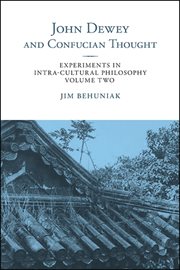Details
PUBLISHED
Made available through hoopla
DESCRIPTION
1 online resource
ISBN/ISSN
LANGUAGE
NOTES
Assesses John Dewey's visit to China in 1919-21 as an "intra-cultural" episode and promotes "Chinese natural philosophy" as a philosophical context in which to understand the connections between Dewey's philosophy and early Confucian thinking. In this conclusion to his two-volume series, Jim Behuniak builds upon the groundbreaking work begun in John Dewey and Daoist Thought in arguing that "Chinese natural philosophy" is the proper hermeneutical context in which to understand early Confucianism. First, he traces Dewey's late-period "cultural turn" in more detail and then proceeds to assess Dewey's visit to China in 1919-21 as a multifaceted "intra-cultural" episode: one that includes not only what Dewey taught his Chinese audiences, but also what he learned in China and what we stand to learn from this encounter today. "Dewey in China" provides an opportunity to continue establishing "specific philosophical relationships" between Dewey and Confucian thought for the purpose of getting ourselves "back in gear" with contemporary thinking in the social and natural sciences. To this end, Behuniak critically assesses readings of early Chinese thought reliant on outdated Greek-medieval assumptions, paying particular attention to readings of early Confucianism that rely heavily on Western virtue ethics, such as the "Heaven's plan" reading. Topics covered include education, tradition, ethics, the family, human nature, and religiousness-thus engaging Dewey with themes generally associated with Confucian thought. Jim Behuniak is Professor of Philosophy at Colby College. He is the author of John Dewey and Daoist Thought: Experiments in Intra-cultural Philosophy, Volume One and Mencius on Becoming Human, both also published by SUNY Press
Mode of access: World Wide Web







